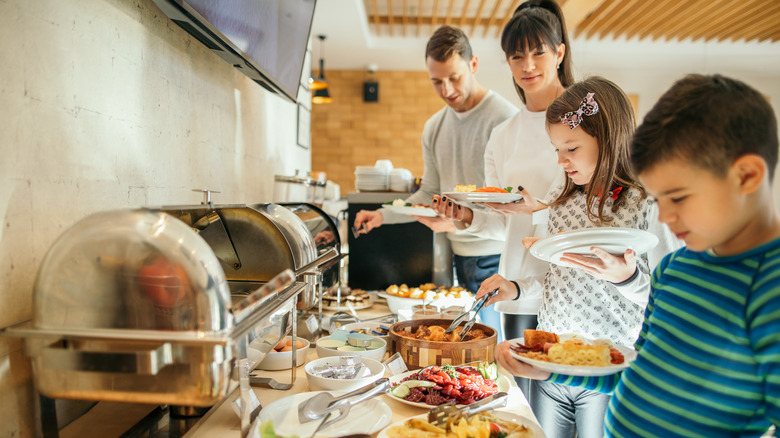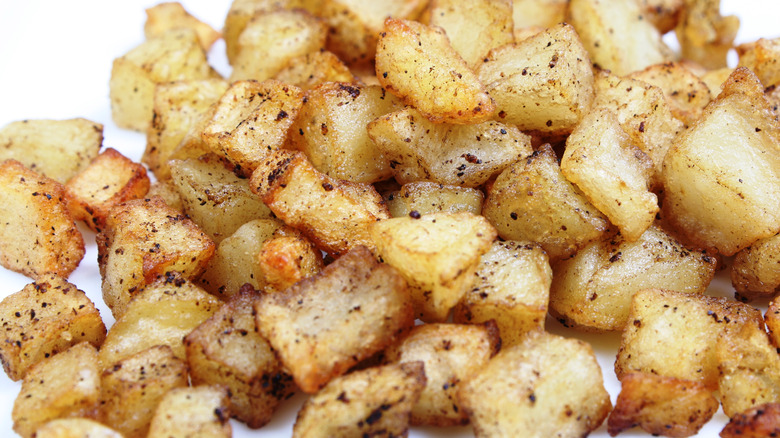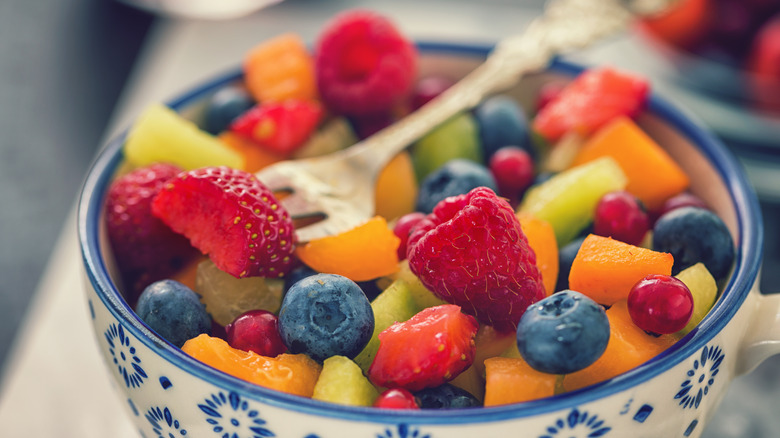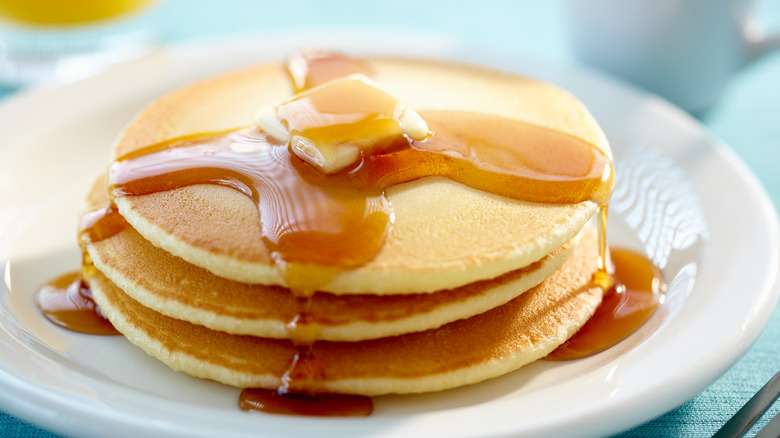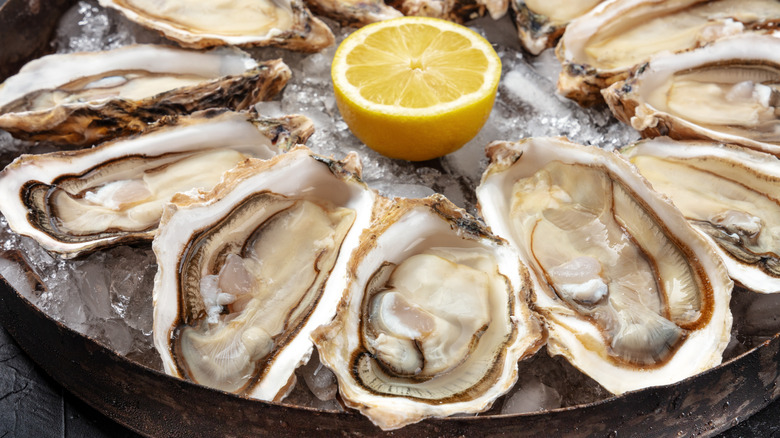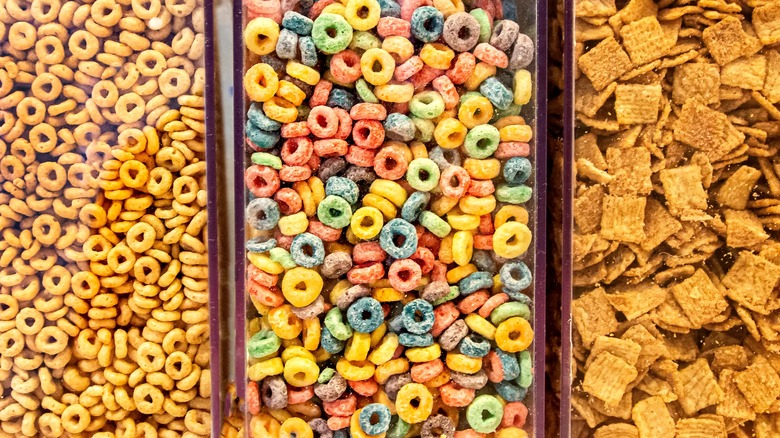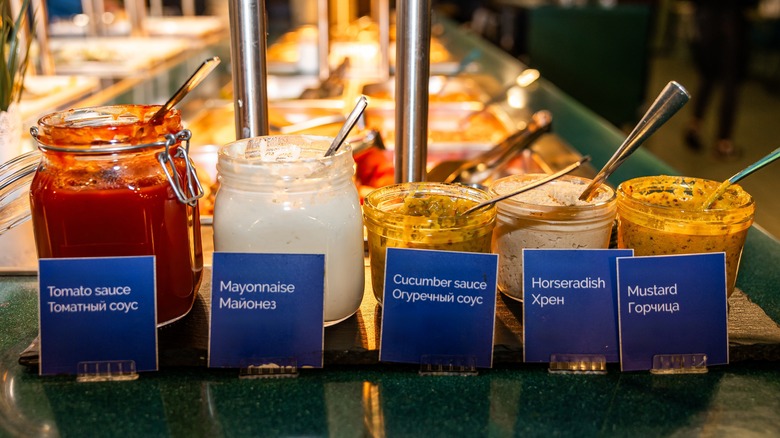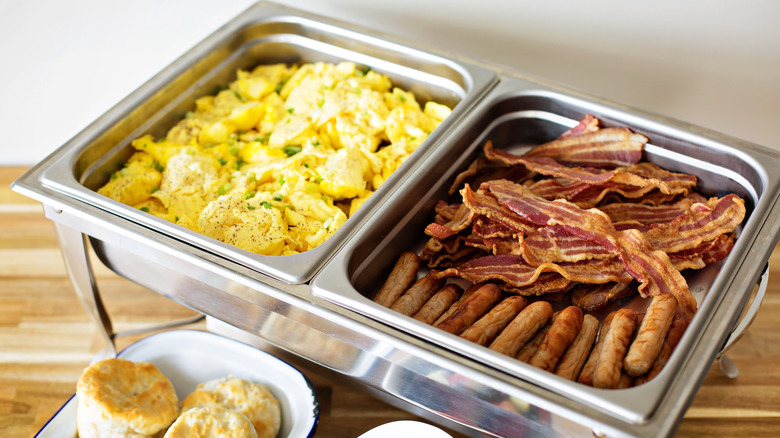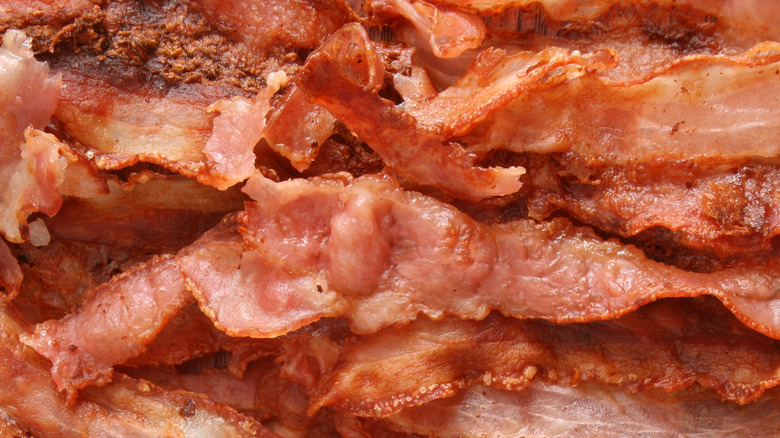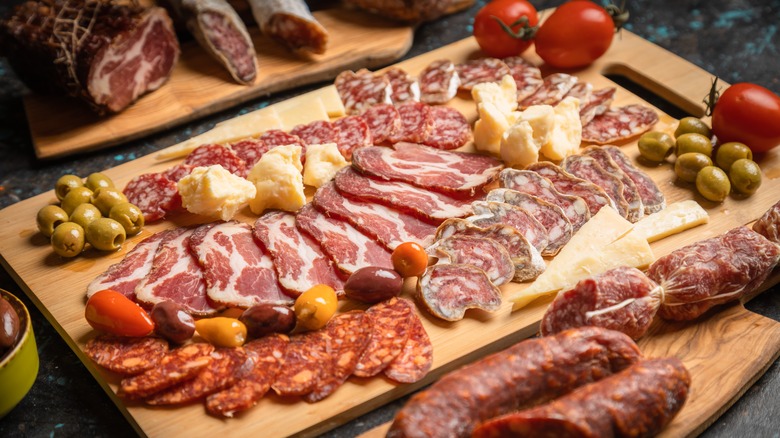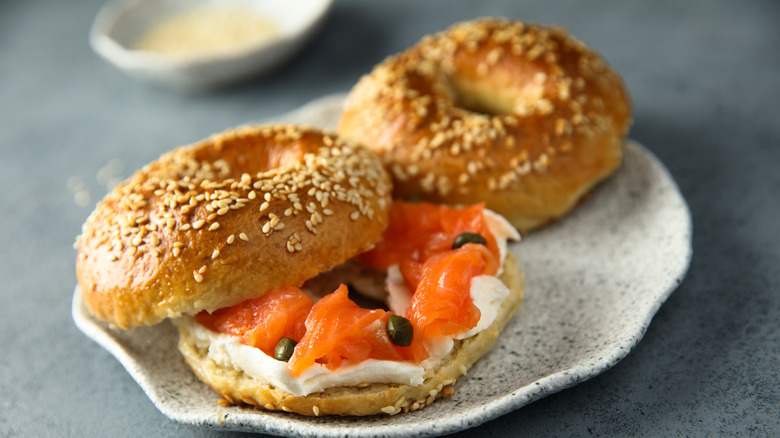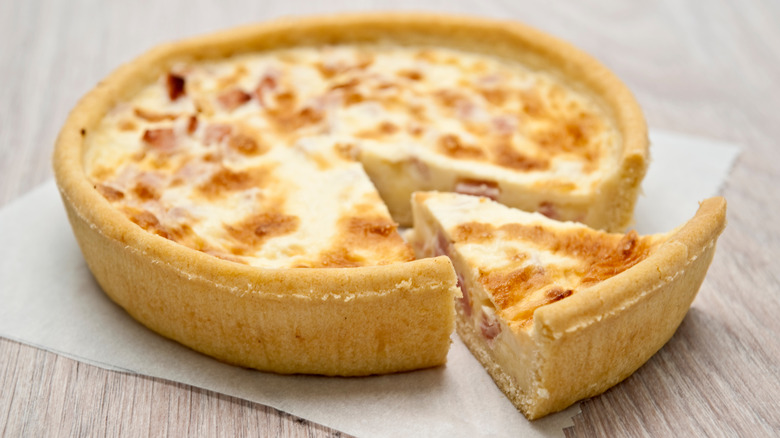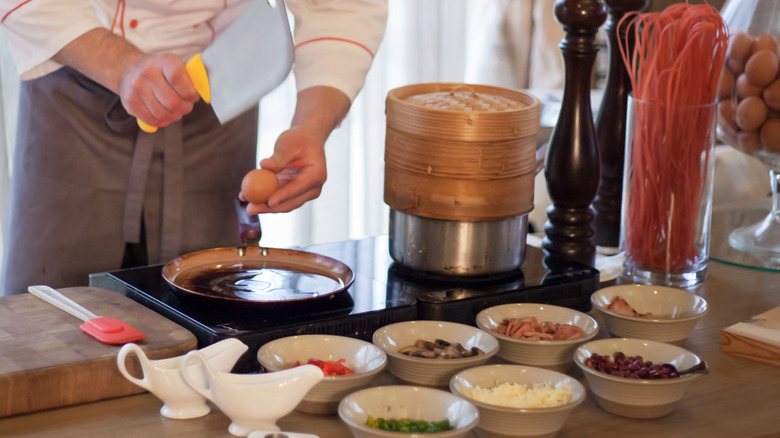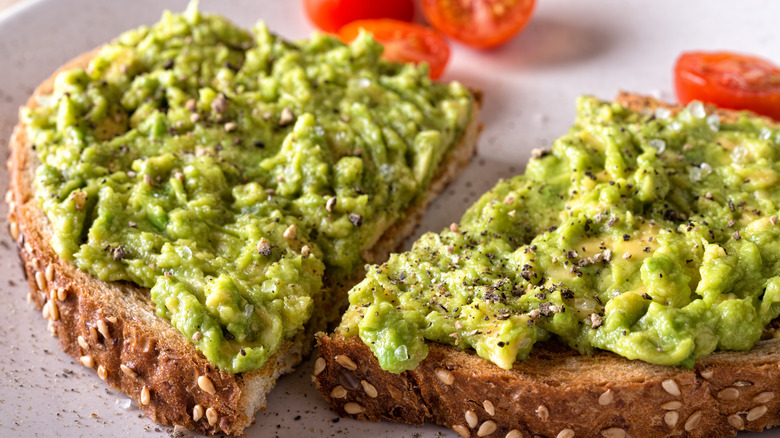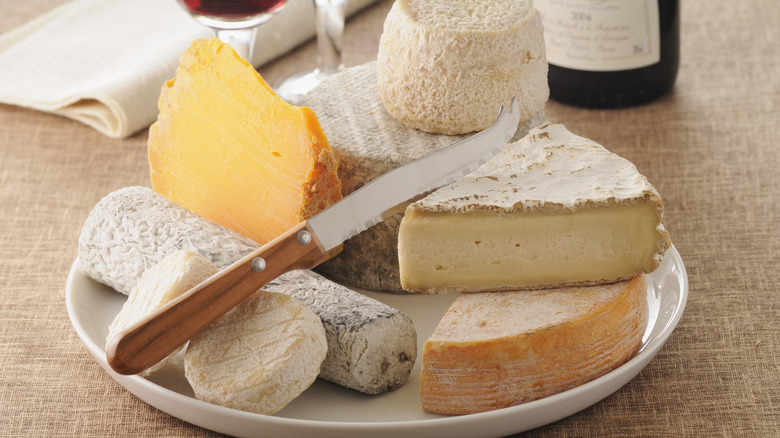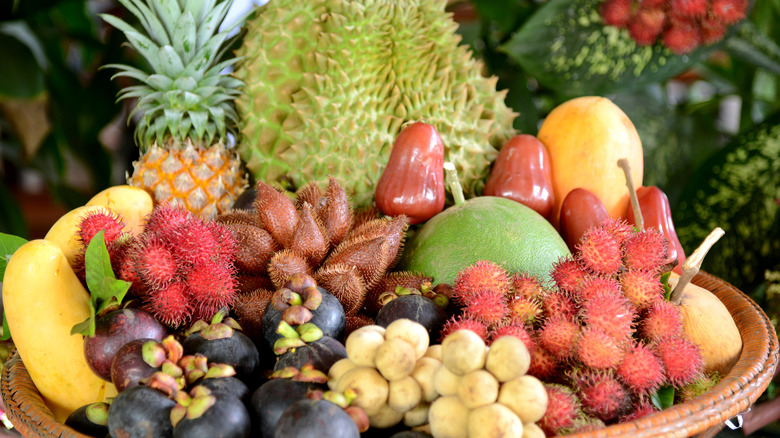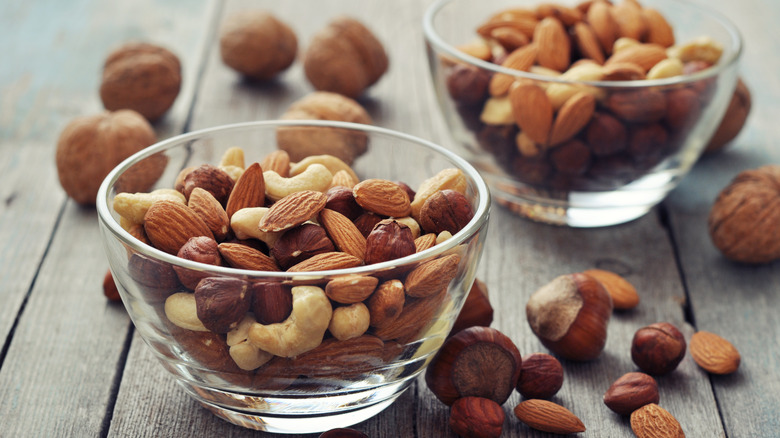8 Best And 8 Worst Foods To Eat At A Breakfast Buffet
Breakfast buffets are a mixed bag for sure. On the one hand, who wouldn't want to face off with a veritable panoply of deliciousness first thing in the morning? There may be no more enticing way to start the day, especially if you're on vacation and are gearing up for some serious sightseeing. On the other hand, when faced with that much choice, it's easy to make the wrong decision.
Starting at a fairly reasonable $10 to $15 per person for a basic breakfast buffet at a Fairfield Inn & Suites and reaching as much as $55 per person at the luxury St. Regis New York, breakfast buffets can be expensive. While that's all well and good if you're choosing dishes that make it worth your while, it's also easy enough to end up paying oodles for cereal that could have cost you about $5 at the store. And being distracted by cheap options isn't the only way you can go wrong at the buffet. Since the food at buffets often sits out for hours, there's a chance digging in may result in a recipe for food poisoning. If you want to make the most of your breakfast buffet experience, here are the best — and the worst — things to go for.
Worst: Home fries
Home fries may seem like a brunch staple, but if they're on the buffet, you may want to steer clear. When they're good, home fries have an excellent crispy-on-the-outside, tender-on-the-inside texture. But more often than not, they're disappointing at best.
Home fries are frequently underseasoned to begin with, and they may also be greasy if poorly prepared. It's perhaps no surprise that Anthony Bourdain thought that "home fries almost always suck" — and he should know. Before Bourdain became a beloved kitchen genius, he frequently manned the brunch or breakfast station, where he claims most home fries were made in massive batches only to be reheated. As a result, he told Thrillist, "Most of the home fries I have in diners are not good, they're not cooked all the way through, they're not crisp." But to add insult to injury, much like french fries, home fries quickly deteriorate the longer they sit out, with the potato's natural moisture rendering the once-crispy starch soggy and insipid. If they weren't good to begin with, they're only going to get worse with time.
Worst: Fruit salad
Fresh fruit is an appealing offer at many a breakfast buffet, and especially if you're on vacation and eating loads of rich food, a fruit salad might seem like the perfect way to start the day. But there are good reasons to be wary of what might seem like such an innocent offering.
Fresh fruit is easily contaminated with pathogens like Salmonella, E. coli, or even Hepatitis A, and this holds especially true for common fruit salad ingredients like melon and berries (via Texas Cooperative Extension). Cantaloupe is particularly problematic, seeing as it's grown on the ground where it can easily pick up bacteria, which are difficult to remove given the netted texture of the rind. This bacteria spreads from the rind to the flesh when cut, and propagates the longer the fruit salad sits out on the buffet tables.
Even if your fruit salad isn't contaminated, however, it may not be the best choice. Sure, fruit is full of fiber and antioxidants, but depending on the recipe, fruit salad may contain hidden sugars in the form of syrups or juices, turning what feels like a healthy choice into a thinly veiled dessert for breakfast. (If you're gonna go that way, at least go for the cinnamon roll.)
Worst: Pancakes
There's nothing that says breakfast more than pancakes, right? But when it comes to the buffet, your attention may be better placed elsewhere. Pancakes are relatively inexpensive to make, which is why chains like IHOP can afford to offer all-you-can-eat deals. (One Redditor who did the math claims you'd need to eat 27 pancakes at IHOP's $5 all-you-can-eat buffet to make it worth it.)
The gut-busting quantities you'd need to make this an economical choice aside, pancakes, much like home fries, are yet another breakfast item that's best fresh out of the pan or off the griddle. As pancakes cool, they can become rubbery and unappetizing, losing the crispy-on-the-outside and tender-on-the-inside texture that makes a good pancake so great. If you're lucky enough to be frequenting a buffet with a fry cook making pancakes to order, go ahead and snag one, but if they're in a steamer tray, best steer clear.
Worst: Raw oysters
If you're looking to get your money's worth at the breakfast buffet, surely oysters, which can cost anywhere from about $4 to nearly $12 a pound, are one of the more sought-after items, right? All we can say is you'd better have good health insurance: The raw bar at a breakfast buffet could be a one-way ticket to the emergency room.
Oysters are particularly vulnerable to pathogenic contamination, thanks to a richness in both protein and moisture. Bacteria like Vibrio vulnificus and viruses like Norovirus can thrive in raw oysters, and if you ingest a contaminated one, you may be spending the rest of your vacation in the bathroom. If you're particularly sensitive to these pathogens, consuming a contaminated oyster could even be deadly (via Food Network). If oysters are kept over ice and shucked to order, you might be safer. But if the oysters have been sitting out or if you're not confident they've been stored over ice, it's best to take a pass and reduce the risk.
Worst: Cereal
With an average price of cereal over three bucks a box, cereal is an inexpensive breakfast buffet offering that hardly seems worth the big-ticket price, especially seeing as you can get the same cereals at your local supermarket. But even at home, cereal is far from the best option, especially first thing in the morning. Most breakfast cereal is jam-packed with added sugars and refined carbs, all the while containing minimal amounts of both protein and fiber. The resulting treats are more like dessert than breakfast, spiking your blood sugar only to render you lethargic and hungry again mere hours later. (The only thing worse than spending a ton of money on a breakfast buffet is having to buy a pricey lunch soon thereafter!)
Perhaps the only cereal that's actually worth it at the breakfast buffet is granola, preferably varieties loaded with nuts and seeds. Not only are these cereals more expensive (especially the organic varieties), rendering them more worthwhile given the buffet's hefty price tag, but nuts and seeds contain both protein and fiber, which will keep you feeling fuller longer than the refined, sugar-loaded stuff.
Worst: Condiments
Condiments like ketchup and mustard have a long shelf life, which should in theory make them a good choice on a breakfast buffet. But in reality, their longevity is a mixed bag. Since they can theoretically be kept around for a long time, there's even more of a chance they'll be contaminated, especially given the number of hands that touch them on any given morning. While good practice dictates that restaurants take special care to keep condiment containers clean, in reality, cross-contamination can be rampant. And this holds doubly true for condiments served in open containers, according to Jay Tetro, an Alberta microbiologist.
"If they are just open and there are spoons and things like that, then there's a very good likelihood that people will get their fingers in there," Tetro tells Daybreak Alberta. "And we know how well people wash their hands. There's going to be potential for contamination." Take care to choose individually sealed packets when possible. Also be especially careful when it comes to condiments with a shorter shelf life, like mayonnaise, salad dressing, or butter, or garnishes like lemon slices, which are veritable breeding grounds for bacteria.
Worst: Scrambled eggs
If you've ever had buffet scrambled eggs that were rubbery, watery, or, as one Redditor put it, "look and taste like wet sponges," you know how they earned their spot on this list. The reality is that breakfast buffet scrambled eggs are often made from powders or solutions that may be cheaper and easier to use, but ultimately cook up way less appetizing than actual eggs. And even if your buffet has splurged for the real thing, once scrambled eggs go out of the pan and into the warming tray, they quickly degrade from rich and creamy to flabby and unappetizing or even grey.
The best scrambled eggs are a labor of love and should be enjoyed immediately, whether you're slow-scrambling them like Gordon Ramsay or adding seltzer for extra fluffiness. Either way, it's best to keep scrambled eggs a special home breakfast and skip them on the buffet line.
Worst: Pre-cooked breakfast meats
Bacon is yet another delicious breakfast staple that suffers significantly longer it sits out: what was once the ideal combination of crispy and chewy tends to become sodden with fat and floppy. Pre-cooked sausage, meanwhile, can tend towards the gray and unappetizing once it spends some time in a steamer tray — at least according to one former hotel worker who counseled her TikTok followers to leave that lid closed. "Steer clear of the meat at most places," she said. "Sausage is not supposed to be grey. Stop eating grey sausage."
But the time under the heat lamp is just one reason you might want to eschew these classic breakfast meats. High in calories, sodium, and saturated fat, processed meat is definitely in the category of a sometimes food. Research has found that the chemicals used in processed meat can lead to increased risk of disease and cancer. This includes cured, smoked, and salted meats — and holds double for anything that's grilled or charred ... including extra-crispy bacon.
Best: Cold cuts
While many cold cuts and deli meats fall into the processed meat category, we'll give them a pass for a couple of reasons. First off, when it comes to what's worth your money at the buffet, these items definitely fit the bill. Proteins, one pro chef writes on Quora, are some of the most cost-intensive elements on any buffet, and this is particularly true if you opt for high-priced imported products like prosciutto di Parma, which can fetch $15 or more a pound, or Spanish pata negra, which can come in at $39.75 a pound.
Of course, if you're going to dig into these delicacies, you will want to err on the side of caution. Deli meat left at room temperature for longer than two hours runs the risk of being contaminated by dangerous bacteria, so if you're not an early bird, only dig in if the deli meat is kept in a refrigerated case or on ice.
Best: Smoked salmon
Smoked salmon is yet another cost-effective choice at the buffet, given its price ranging from $30 to $75 per pound. But in addition to making the buffet price well worth it, smoked salmon is likely one of the healthier choices on offer, rich in healthy omega-3 fatty acids that help promote improved brain, heart, and eye health. Smoked salmon is also rich in protein and B vitamins, which help you stay fuller longer and give you energy — a double-barreled bonus for vacationers looking to make the most of their day once the buffet is over (via Yahoo).
Since smoking started as a method of preservation, it should come as no surprise that smoked salmon can keep at room temperature for longer than raw seafood — and this holds even more true for hot smoked salmon, which has a flakier texture more similar to cooked salmon than cold-smoked salmon, which retains a raw appearance. That said, this isn't an invitation to hold it indefinitely. Smoked salmon, whether hot- or cold-smoked, should be kept chilled on the buffet and consumed within two hours of being removed from refrigeration to reduce the risk of contamination and foodborne illness. If you get the sense the salmon has been lingering, keep on swimming.
Best: Quiche
Unlike many other egg-based dishes, quiches are actually designed to be kept and enjoyed chilled or at room temperature — it's no surprise they're such a common picnic offering! Quiches offer loads of variety, whether studded with bacon in the case of a classic quiche Lorraine or filled with broccoli and cheddar for a tasty, cheesy vegetarian recipe. And given the work they require, especially if they're made with homemade crust, they're a great choice at a buffet.
Quiche is made with a set custard and can be kept for several days in the fridge, meaning it's not the most worrisome of offerings from a food safety perspective. That said, much like cold cuts and smoked salmon, it's best kept in a chilled case on a buffet. If you suspect it's been out for longer than two hours, it's best to avoid this treat in favor of other baked goods with a lower moisture content, making them less likely contenders for contamination.
Best: An omelet from the omelet station
If your buffet has an omelet station, by all means, make a beeline for it: While there may be nothing less appealing than scrambled eggs held in a chafing dish until they're rubbery, there's perhaps nothing more luxurious than watching a chef prepare an omelet for you to order.
Omelet stations are great in more ways than one. Not only does each diner get the chance to be the boss of their own breakfast, customizing the fillings according to not only by preference and allergies, but there is perhaps no experience of dining out that gets the dish from pan to plate faster. And an omelet is really at its best piping hot when the interior is still a bit creamy. If you want to get an even better bang for your buck at the omelet station, keep a lookout for top-notch mix-ins like cheese, truffles, specialty meats, or even caviar.
Best: Avocado
It's not for nothing that millennials get so much flak about their addiction to avocado toast: Avocados are expensive. And while avocado habits are likely not what's causing the low rate of homeownership among this generation as Australian real estate mogul Tim Gurner seemed to think back in 2017, at around a dollar apiece, avocados are definitely a worthwhile prize on the breakfast buffet line.
Avocados aren't just a financially sound choice; they're also a nutritious one. Loaded with fiber and healthy fats, avocados may contribute to lower cholesterol and better heart health, according to experts. Some research indicates avocados can help improve digestive health and even reduce the risk of cancer (via Health). In the shorter term, avocados also keep you fuller for longer, meaning that you're raring to go once you've left the buffet behind. And since avocados are perfectly happy at room temperature — particularly before being sliced — they're the ideal option on a buffet.
Best: Good cheese
Good-quality cheese is pricey, which makes it a strategic choice on a buffet, and it's perfectly happy at room temperature, which makes it a delicious and fairly safe one. Most buffets have some sort of cheese, but look beyond the bog standard cheddar and Swiss to see if there are some imported delicacies like French Brie or Spanish manchego to sample, and you'll be getting an even better bang for your buck.
Moreover, bear in mind that European cheeses are just the beginning. Artisan American cheeses are becoming more and more available throughout the country and are even gaining international renown, with Oregon's Rogue River Blue earning the distinction of the world's best at the 2019 World Cheese Awards. A good-quality buffet may serve up some ultra-local delicacies you wouldn't have a chance to sample back home. And since the whole point of a buffet is to sample a bit of everything, you can afford to be a bit more adventurous, knowing there's no need to invest in a big block of cheese you're not sure you'll love to give it a try.
Best: Fresh local fruit
Fruit salad and cut fruit may be a health risk, but if you're confident the fruit has been kept chilled, fresh local fruit may well be one of the healthiest and most economical choices you can make on the breakfast buffet. Fresh berries are loaded with antioxidants and rich in fiber, which helps you stay fuller longer, and local delicacies like Australian Kensington Pride mangoes or Malaysian Musang King durian may prove to be once-in-a-lifetime offerings you just won't find anywhere else.
If you want to take a chance with fresh fruit, just err on the side of caution. If you're not sure the fruit has been kept chilled once sliced, consider asking a member of staff if it's possible to have a whole piece fresh. And if that's not possible, you can always snag a self-contained fruit like an apple, banana, or pear, which can be washed and peeled before eating to minimize the risk of foodborne illness significantly.
Best: Nuts
If your breakfast buffet boasts nuts, jump on them! Nuts can be phenomenally expensive, particularly pine nuts, pecans, cashews, almonds, and macadamia nuts, which are generally believed to be the world's most expensive nuts. The reasons for this are linked to many factors, including the labor-intensive harvests of nuts like almonds or cashews and the strict climate conditions required for pecans or pine nuts. Suffice it to say, that at around $23 a pound for pine nuts or $25 a pound for macadamia nuts, an all-you-can-eat buffet is a good place to dig in.
But nuts aren't just a good choice from a cost analysis standpoint. Rich in healthy fats and fiber, not to mention minerals like potassium and magnesium, nuts are a great choice first thing in the morning if you want to be full and nourished for the day ahead. (Plus, you can always sneak any extras into your pocket for the perfect snack later on in the day.)
